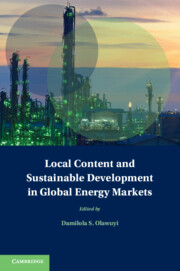Book contents
- Local Content and Sustainable Development in Global Energy Markets
- Reviews
- Treaty Implementation for Sustainable Development
- Local Content and Sustainable Development in Global Energy Markets
- Copyright page
- Contents
- Preface and Acknowledgements
- Abbreviations
- Editor
- Contributors
- Part I Introductory Context and Principles
- Part II Case Studies
- Part III Lessons Learned and Future Directions
- 19 Local Content, Community Content, and Sustainable Development in the Oil and Gas Industry: Perspectives from Legislation, Policy, and Community Development Agreements
- 20 Local Content Requirements and Social Inclusion in Global Energy Markets: Towards Business and Human Rights Content
- 21 Advancing Sustainable Development in Local Content Initiatives: Summary for Policy Makers
- Index
20 - Local Content Requirements and Social Inclusion in Global Energy Markets: Towards Business and Human Rights Content
from Part III - Lessons Learned and Future Directions
Published online by Cambridge University Press: 05 March 2021
- Local Content and Sustainable Development in Global Energy Markets
- Reviews
- Treaty Implementation for Sustainable Development
- Local Content and Sustainable Development in Global Energy Markets
- Copyright page
- Contents
- Preface and Acknowledgements
- Abbreviations
- Editor
- Contributors
- Part I Introductory Context and Principles
- Part II Case Studies
- Part III Lessons Learned and Future Directions
- 19 Local Content, Community Content, and Sustainable Development in the Oil and Gas Industry: Perspectives from Legislation, Policy, and Community Development Agreements
- 20 Local Content Requirements and Social Inclusion in Global Energy Markets: Towards Business and Human Rights Content
- 21 Advancing Sustainable Development in Local Content Initiatives: Summary for Policy Makers
- Index
Summary
This chapter offers an investigation of the business and human rights concerns resulting from energy projects in sub-Saharan Africa, using Nigeria as a focal case study. This investigation focuses on whether local content requirements (LCRs) in Nigeria’s domestic laws have induced social exclusions and various human rights violations, or in the alternative, enhanced sustainable development, accountability and respect for human rights. In Africa, energy projects have become avenues for strong socio-economic, political, and cultural contestations among a diversity of actors. Such projects more often than not produce social exclusions for stakeholders, and leads to damaging effects on the business, cultural and economic development of marginalized communities. While the participation of a local community is indispensable to an understanding of the local context, citizens must be able to lead their own development and build their own institutions. The emerging business and human rights approach to energy projects supports a people-based development model, potentially capable of more readily addressing issues of social injustice, corporate irresponsibility and the marginalisation of local communities. Tackling the core problems of development, from social exclusion to economic growth and environmental sustainability, requires understanding how LCRs operate and interact at multiple levels. This chapter contends that integrating human rights language to energy projects must be anchored on a solid based pragmatic approach that takes cognizance of domestic regulatory capacity, institutional efficacy and democratic legitimacy of governance institutions. The chapter advocates for legal and institutional pathways for integrating business and human rights norms into the design and implementation of LCRs.
- Type
- Chapter
- Information
- Publisher: Cambridge University PressPrint publication year: 2021



